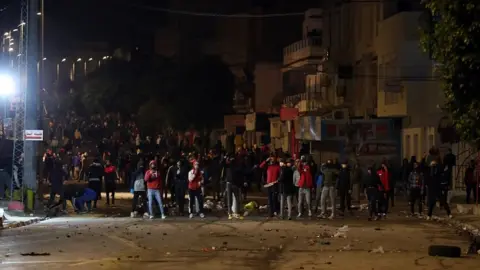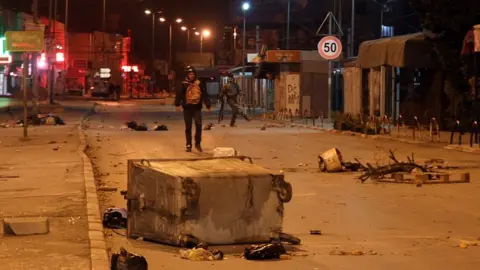Tunisia protests: Hundreds arrested as clashes continue
Police in Tunisia say they have arrested more than 600 people as a fourth night of violent protests saw protesters return to the streets.
On Monday, crowds of mainly young demonstrators again gathered in the centre of the capital, Tunis, throwing stones and petrol bombs at police.
Security forces responded with tear gas and water cannon.
Tunisia faces severe economic problems and a third of its young people are unemployed.
The economic crisis has worsened under the pandemic.
The latest unrest comes almost exactly 10 years since the Tunisian revolution ushered in democracy and triggered the Arab Spring revolts across the region. However, hopes that this would bring more jobs and opportunities have been disappointed.
Outside Tunis, clashes were reported on Monday in the cities of Kasserine, Gafsa, Sousse and Monastir.
A spokesman for the interior ministry said the majority of those arrested since the current wave of protests began on Friday were minors who had been detained over acts of vandalism and looting.
Khaled Hayouni said two policemen had been injured.
"This has nothing to do with protest movements that are guaranteed by the law and the constitution," Mr Hayouni said. "Protests take place in broad daylight... without any criminal acts involved."
 EPA
EPAThe clashes took place mainly in densely populated and under-privileged areas where the relationship between young people and the police is historically tense, the BBC's Rana Jawad in Tunis reports.
Social tensions have worsened under sporadic lockdown measures and a nightly curfew in place since October to combat the spread of the coronavirus, our correspondent says.
Earlier on Monday, demonstrators gathered outside government offices in Tunis's Bourguiba Avenue calling for those arrested in recent days to be released. They chanted "no fear, no fear, the street belongs to the people".
 EPA
EPAOne protester, Sonia, an unemployed graduate who did not give her family name, said: "They call everyone who protests against the system a thief. We have come with exposed faces by day and not by night to say we want jobs...we want dignity."
Amnesty International urged authorities to exercise restraint and to uphold the rights of those detained.
A decade on from the revolution that overthrew the dictatorship of Zine al-Abedine Ben Ali, many Tunisians are growing increasingly angry at stubbornly high unemployment and poor public services.
The economy shrank by 9% in 2020 and consumer prices have risen sharply.
Tunisia's key tourism industry has been particularly badly hit by the pandemic.
